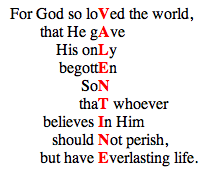I just had a visit from the Jehovah’s Witnesses. (You know if you’re nice to them once, they keep coming back, but if they talk to me they have to listen to me too.) Today’s topic of conversation was The Marks of a True Christian. What makes someone a true Christian, and how can we know it? I don’t think that we can really know for sure, because the state of a person’s soul is between that person and God, but I do think that there should definitely be some evidence to make us suspect. By evidence I don’t mean where they go to church, whether they wear a cross around their neck, how they dress or how they cut their hair. Anyone could profess to be a Christian if these were the only requirements.
Romans 10:9 makes it clear that you will be saved if you believe in your heart and declare with your mouth that Jesus is Lord and that God raised Him from the dead. John 3:16 says that whoever believes in Jesus will have everlasting life. So that’s what makes you a Christian. But how does the rest of the world know that you are one?
In John 13:34, Jesus told His disciples that He was giving them a new commandment—to love one another. Now the commandment to love was not new. It had been around since the days of Moses. (Leviticus 19:18) But the old commandment was to love your neighbour as yourself. Now Jesus was telling the disciples to love each other as He loved them. These were the disciples that argued about who was greatest, (Mark 9:33-37, Luke 9:46-48, Luke 22:24-27) and who would sit at Christ’s side in heaven. (Mark 10:35-40) They didn’t really have the servant attitude that Christ demonstrated. Shortly before Jesus said this, He had washed His disciples feet, and told them He wanted them to do the same. (John 13:3-17, John 13:14-15) Shortly afterward He gave up His life for them and for us. (John 19:30) That’s quite an example to follow, but if we do, others will know we are Christians by our love. (John 13:35)
Can you be saved and not be loving? Can you be loving and not be saved? Yes, and yes. But if we have a personal relationship with Jesus, we are encouraged and commanded to love one another. And if we love each other the way that Christ loved, people are going to notice, and wonder why. Does that mean being nice to the Jehovah’s Witnesses when they come to the door so that they can see the love of Jesus too? For me it does.

